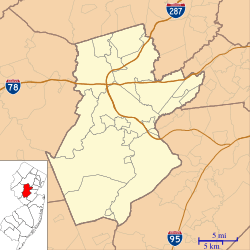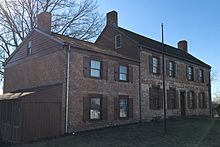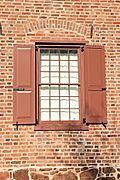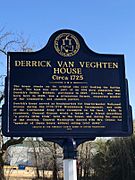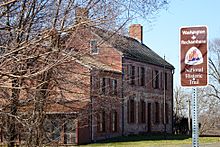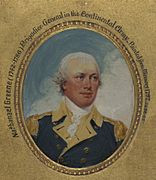Van Veghten House facts for kids
|
Van Veghten House
|
|
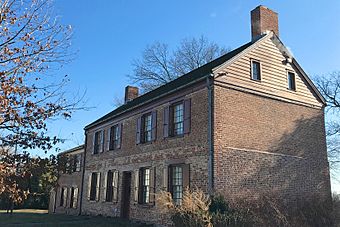
Van Veghten House, looking east, 2018
|
|
| Location | 9 Van Veghten Drive Bridgewater, New Jersey |
|---|---|
| Area | 1 acre (0.40 ha) |
| Built | c. 1725 |
| Architectural style | Greek Revival |
| NRHP reference No. | 79003253 |
Quick facts for kids Significant dates |
|
| Added to NRHP | October 10, 1979 |
The Van Veghten House is a very old and important building. It is located in the Finderne area of Bridgewater Township, New Jersey. This house was built a long time ago, around 1725.
During the American Revolutionary War, it was used as a main office. General Nathanael Greene, who was in charge of army supplies, had his headquarters here. This was during the second Middlebrook encampment (1778–1779). Today, the Somerset County Historical Society owns the house. They use it as their main office, a museum, and a library. The house is special because it is one of the few old mansions left along the Raritan River. It was added to the National Register of Historic Places on October 10, 1979.
Contents
History of the Van Veghten House
Early Days and Owners
In 1697, a man named Michael Van Veghten bought a large piece of land. It was 834 acres along the Raritan River near Finderne. Michael's son, Derrick, inherited this property when his father passed away in 1737.
A Home During the Revolution
During the American Revolutionary War, the Continental Army set up camp nearby. This was known as the second Middlebrook encampment. Derrick Van Veghten allowed General Nathanael Greene to use his house as a headquarters. General Greene's wife, Catharine Littlefield Greene, also stayed there. Derrick did not ask for any payment for this. The farm land was also used for the soldiers' camp.
A Dance with General Washington
Something fun happened at the Van Veghten House during the war. On March 19, 1779, General Greene wrote a letter about a dance party. General George Washington himself attended this party! General Greene said that General Washington and Mrs. Greene danced for more than three hours without stopping. It sounds like they had a great time!
French Army Marches By
Later, on August 30, 1781, the French Army marched past the house. This was the First Brigade of the French Army. They were led by General Comte de Rochambeau. They were following a special route to Yorktown, Virginia. This march was part of a big plan with the American army. The French soldiers walked about 13 miles that day. The American army also marched nearby on different roads.
Derrick Van Veghten passed away in 1781. His son, Michael Van Veghten (1764–1831), then took over the estate.
What the House Looks Like
Building Materials and Style
The Van Veghten House has two and a half stories, plus a basement. The foundation is made of strong brownstone. The first floor has special brickwork called Flemish bond on the south and west walls. This pattern makes the bricks look very neat. Other parts of the house use a simpler brick pattern called common bond.
You can see iron anchors on the south wall. These anchors help hold the building together. They are near the brick arches above the windows. Around 1837, the house was updated. It was changed to the Greek Revival style. This style was popular for its grand and classic look. The house still has four fireplaces from that time, designed in the Greek Revival style.
Gallery
-
Nathanael Greene,
by John Trumbull, 1792
More to Explore
- Van Veghten's Bridge
- Other houses used as headquarters during the second Middlebrook encampment (1778–1779):
- Wallace House – General George Washington
- Van Horne House – General William Alexander, Lord Stirling
- Staats House – General Friedrich Wilhelm von Steuben
- Jacobus Vanderveer House – General Henry Knox
 | Charles R. Drew |
 | Benjamin Banneker |
 | Jane C. Wright |
 | Roger Arliner Young |


